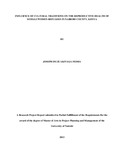| dc.description.abstract | Approximately 1000 women die each day worldwide from pregnancy related causes, 99% of them in developing countries and more than 50% in sub-Saharan Africa (WHO, 2008) with most deaths concentrated around the time of delivery. The study set out to establish the influence of cultural traditions on the reproductive health of Somali women refugees in Nairobi, Kenya. The objectives of the study were to establish the impact of traditional birth attendants to maternal health among Somali refugees in Nairobi; to investigate the extent to which attitudes towards family planning and contraception among Somali refugee women in Nairobi has an effect on their reproductive health; to determine the influence of female circumcision on reproductive health among Somali women refugees in Nairobi; and to establish the influence of food taboos on reproductive outcomes among Somali women refugees in Nairobi. The study was conducted as a cross sectional survey. The target population was all Somali women refugees in Nairobi.
Sample size was determined by use of Fischer equation (n=Z2pq/e2). Snowball sampling was
used in this study. Questionnaires were pre-tested at the School of Communication at Daystar University, Nairobi. Data was collected by the researcher over a period of four weeks by the use of self administered questionnaires from respondents who can read and write and also with the assistance of the researcher for those illiterate respondents. All questionnaires were edited and responses coded before data was entered into the computer by the use of the Statistical Program for Social Scientists (SPSS), version 11.5. Cross tabulation was the main method used for data analysis. After analysis, data was summarized and presented in form of frequency tables, percentages and proportions. 75% of the respondents reported reliance on the services of TBAs, most of whom are untrained, for antenatal care. 65.1% of the respondents reported complications before labor. Even with these complications, a considerable number of respondents, 39.1%, sought the help of TBAs instead of specialized care from hospital. 51.8% of the respondents reported to have delivered at home while 41% of those who delivered at home reported to have been assisted by TBAs. There is also a strong correlation between complications during labor and delivery and assistance place of delivery. In family planning, the use of contraceptives was found to be very low. Only 27% of the respondents reported the use contraceptives as compared to 56.1% of the respondents who reported not to be using contraceptives. Many women are exposed to high risk pregnancies that would be avoided through family planning. With regard to FGM, 91% of the respondents were circumcised. There was a strong correlation between birth complications and FGM. 62.9% of the respondents reported that they had experienced a complication in their reproductive history. As to food taboos, 70.8% of the respondents reported that in their pregnancies they had avoided some foods. Foods avoided include eggs, 96.8%; milk,
85.7%; red meat, 71.4%; white meat, 58.7%; beans, 33.3%; and other foods like groundnuts,
cheese, fish, bread, cakes, banana, and potatoes, 20.6%. Most of these foods are livestock products which are major sources of proteins essential nutrients for the rapidly growing fetus and the mother. The study recommends that among the Somali refugee community should be trained to be able to recognize complications, and learn more reproductive health information. There also should be concerted and strengthened actions towards eliminating food taboos among Somali refugee women. Religious leaders should also be involved in disseminating messages especially against harmful traditional practices such as FGM and encourage their followers on the needs for family planning choices. | en |

